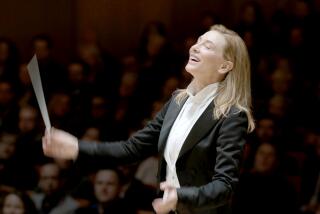Masterpiece Revived: Boulez Leads ‘Cantata Profana’
- Share via
Bartok’s “Cantata Profana” (1930) is one of those works that, once heard, is likely to leave a listener searching not only for superlatives but for reasons why music so original and provocative is so little known.
Based on the composer’s own folk-based text, the 20-minute Cantata tells of nine young hunters, untrained by their father for anything beyond blood sport, who are transformed into nine giant stags, themselves to become the targets of hunters.
The cautionary tale is told via music cast in one of several exotic styles the composer indulged in, this one a thrilling mix of Baroque choral polyphony applied to Hungarian and Romanian rhythms and modes, with suggestions (particularly in the tenor solos) of something even further to the east and, fleetingly, of the percussive fury of the roughly simultaneous Second Piano Concerto.
This rare masterpiece is exhumed by the ever-vigilant Pierre Boulez, who directs the Chicago Symphony Orchestra and Margaret Hillis’ Chicago Symphony Chorus in its first digital recording (Deutsche Grammophon 435 863).
It’s an intense, meticulously crafted performance that nonetheless misses a good deal of the work’s primordial mystery and menace. There’s too much healthy sunlight, hardly a trace of the fog-shrouded forests in both playing and choral singing under Boulez’s crisply articulated beat and in DG’s brilliant recording.
And even a listener unaccustomed to the authentic sounds of the Hungarian language and voice may find too much of the Anglo-Saxon choirboy sound, and hardly a trace of the terror of the situation, in tenor John Aler’s execution of the cruelly high-lying part of the No. 1 son and stag, while bass John Tomlinson is simply a pain in the ear as he grumbles and wobbles his way through the hardly less exigent lines of the grieving father.
Comparison with the only other available recording, in which the late Janos Ferencsik directs the Budapest Symphony and Chorus (Hungaroton 12759), gives us both the score’s sinew and its highly distinctive atmosphere, if without the instrumental sheen of Boulez’s Chicago forces.
The idiom is everything here, and all concerned have it in their bones. Furthermore, the recording has in Josef Reti a tenor soloist strikingly able to project the awesomeness of the sons’ plight without falling vocally to pieces.
One of the indispensable Bartok recordings--not at all hurt by being coupled with Ferencsik’s lively, lyrical reading of the Concerto for Orchestra. Not the sort of virtuoso romp normally associated with the familiar showpiece, but a performance that makes all the music’s wonted points with unjaded skill and enthusiasm.
The Boulez coupling is splendid as well: the composer’s early ballet, “The Wooden Prince,” a delectable stylistic hodgepodge in which (against the dictates of chronological possibility) Richard Strauss, Debussy, Prokofiev, Gershwin and Puccini’s Ping, Pang and Pong tumble all over each other, at times being subjected to Liszt-like experiments in tonality-stretching but orchestrated with a natural flair Liszt might have killed for.
The performance by Boulez and the Chicagoans is spectacular in the best sense.
The familiar coupling of Bartok’s two late works for chamber orchestra, “Music for Strings, Percussion and Celesta” and the Divertimento for strings, has rarely sounded better than in a recent release from the Franz Liszt Chamber Orchestra of Budapest, directed from the concertmaster’s chair by Janos Rolla (Quintana 903052).
While neither work lacks superior recorded representation, there is something quite special in these players’ perfectly timed swings from the fiercely incisive to the broadly lyrical.
But hurry. Quintana, Hungary’s first free-enterprise recording label, is no more, having fallen victim to the diminished financial capabilities of the Western investors who kept it afloat for the three years of its existence.
More to Read
The biggest entertainment stories
Get our big stories about Hollywood, film, television, music, arts, culture and more right in your inbox as soon as they publish.
You may occasionally receive promotional content from the Los Angeles Times.










